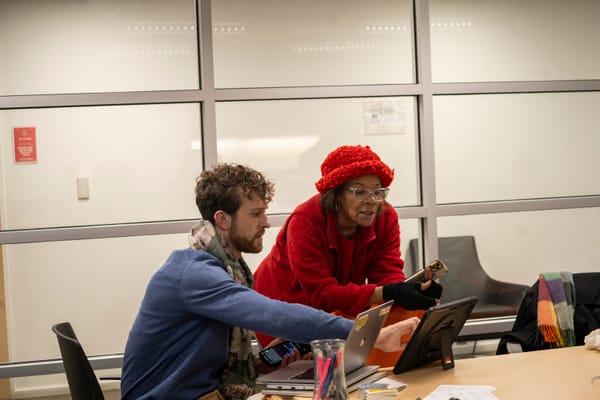Giving up on agendas but not audience

Last week I challenged you to read a news story and ask yourself, sentence by sentence, if it was delivering information that was either valuable or actionable.
It wasn't an exercise meant to denigrate storytelling. I know not everyone wants their news source to just inject info straight into their veins all the time. But I did want to wrestle with the idea that the story format has inherent utility, something a lot of us in news don't often question.
But there is no better time for questions than now. Maybe that's why it felt (strangely) energizing to read and think about why news organizations have lost so much of their relevance in the last several years. (It will only take you about 3 minutes to read this post, so you have plenty of time and energy left for your musings.)
My food for thought came straight from 2012, when News on the Internet, a slim academic work by David Tewksbury and Jason Rittenberg, was published. There was plenty of tumult and tragedy that year, in which 17-year-old Trayvon Martin was shot and killed in Florida after buying a bag of Skittles candy. A jury declined to hold his killer accountable the next year.
The Republican nominee for President of the United States in 2012 was Mitt Romney and the far right of his party tried unsuccessfully to mainstream lies about his competitor, Barack Obama, during the race. Israeli Prime Minister Benjamin Netanyahu's government launched a rocket attack into Gaza in November 2012, and began a war with Hamas that ended in a cease fire 8 days later. Ten days before Christmas of that year, 20 first-graders and 6 adults were murdered in a mass shooting at Sandy Hook Elementary School in Connecticut.
It is difficult, in hindsight, not to feel like these events were decision points. We instead just plowed straight through, societally. News on the Internet helped me better understand why the news might have contributed to the acceptance of so much that year, and what we can do differently in our current moment.
I had been working in news for only two years in 2012, but knew the entire endeavor was shifting beneath our feet. I didn't understand why, but got the sense things were out of our control. There was more competition and less money, and we were in the wind.
Tewksbury and Rittenberg complicate that view by showing how the actions of larger news organizations, like the NPR affiliate where I worked, accelerated their downfall and helped create conditions ripe for polarization.
They point to an economic principle called Hotellings Law to explain that when there are fewer providers of a good, providers of the good want to position themselves toward the middle of their customers’ preferences. Customers might lose out on some choice, but there is stability. It's less work for the producers, and if there isn't much competition, providers can get away with serving the middle. White cars, IKEA, McDonald's hamburgers coming standard with ketchup and mustard. I'm spitballing. Hotellings Law also explains why very large news networks would offer nightly news programs full of “mainstream” public affairs content.
As the internet fueled competition, however, the cost of competition for that large audience also increased. Tewksbury and Rittenberg had already seen these big fish balk at the cost of maintaining a mass audience by 2012. Specializing was cheaper, so they got more comfortable with it. In 2012, CNN's U.S. audience was more than 88% white, almost 70% were making above the median income, and more than 60% had a college degree.
This was a revelation! I'm generally tough on the big news businesses like Gannett or CNN, or even FOX and NPR. But I had understood their lack of a general audience as the result of a failure to adapt, not an abandonment. I now see it differently. News organizations were not left in the wind, the people they no longer valued were.
On top of this intentional specialization, News and the Internet invites us to layer on the reticence of large news orgs to give up their agenda setting role. The research cited here shows that larger news organizations wanted to serve smaller audiences but continue to dictate what constituted news more generally. This was a fools errand, not to mention gross, and it didn't work. “Features of how news is presented online will mute the agenda constructed by journalists,” Tewksbury and Rittenberg predicted.
I've always believed journalists' comfort with agenda setting was dangerous hubris. So just give up already! Let's be freed by the fact that folks studying the news already knew agenda setting was a doomed enterprise 12 years ago (!) and come up with other frameworks for coverage that is both responsive and responsible. Let's ask ourselves, why would my community need this? How do I know? Identifying and filling broad-scale information and accountability gaps are great frameworks, but they must be far from the only ones we can turn to now.
Some final takeaways from News on the Internet:
📚 People have different levels of motivation to learn from news or content, and motivation to learn is a predictable driver of engagement with news.
🤔 Knowing this now, what are we doing to increase curiosity? What are ways to resist the way political speech and political and corporate propaganda tries to stymie curiosity?
🏫 Can people learn from it? It's a good question news producers don't ask ourselves enough. If people can't learn from the news, it can't fill its role in democracy.
💡 We're going to have to come up with more ways to spark curiosity and encourage learning in this space. The Documenters program is one great and successful example. What are others?
I don't know why reading this book made me feel better, but it did. Maybe I do know why, it's because it reminds me how many people are out there looking for answers, and how easy it is to be inspired and motivated by information. If I had published an academic book more than a decade ago, I would not expect it to become important to somebody looking for answers today. But it did.




